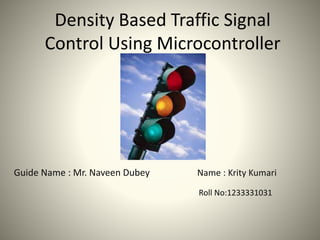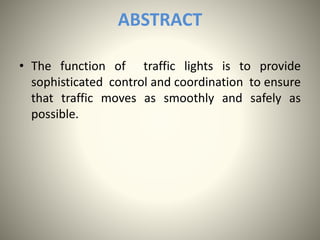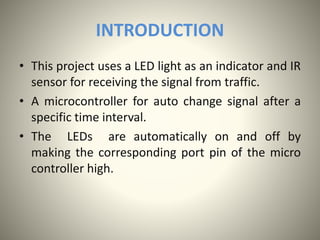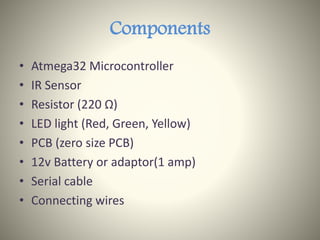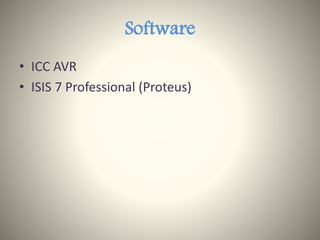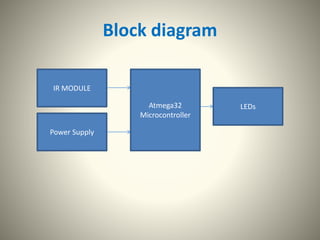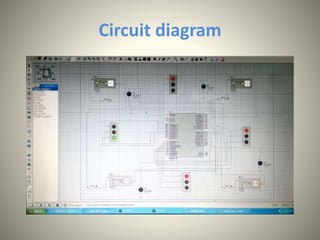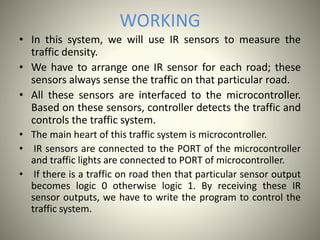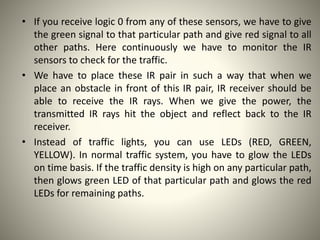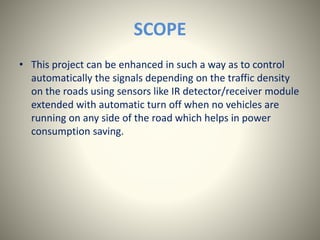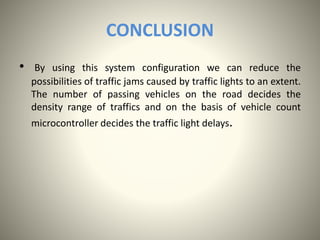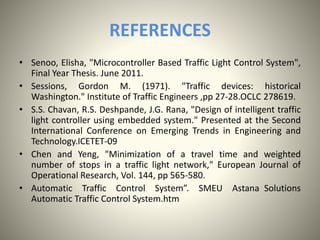Density based traffic signal control using microcontroller
- 1. Density Based Traffic Signal Control Using Microcontroller Guide Name : Mr. Naveen Dubey Name : Krity Kumari Roll No:1233331031
- 2. History of traffic light • The world's very first traffic lights were invented by J P Knight installed near London's House of Commons, which was on the intersection of George and Bridge Street, in 1868. • In 1914 The American Traffic Signal Company installed red and green traffic lights on every corner of the intersection of 105th Street and Euclid Avenue in Cleveland, Ohio. • First traffic lights were all controlled by either timing, or manually switched
- 3. RED • Come to complete stop at stop line or before crosswalk or intersection. • After stopping, you may turn right on red at most intersections if the way is clear. • Some school districts have local policies that prohibit right turns on red by bus operators. • Some intersections display “NO TURN ON RED,” which you must obey.
- 4. YELLOW • Stop if you can do so safely. • The light will soon be red. GREEN • Go, but only if intersection is clear. • If turning left, wait for gap in oncoming traffic to complete turn.
- 5. ABSTRACT • The function of traffic lights is to provide sophisticated control and coordination to ensure that traffic moves as smoothly and safely as possible.
- 6. INTRODUCTION • This project uses a LED light as an indicator and IR sensor for receiving the signal from traffic. • A microcontroller for auto change signal after a specific time interval. • The LEDs are automatically on and off by making the corresponding port pin of the micro controller high.
- 7. Components • Atmega32 Microcontroller • IR Sensor • Resistor (220 Ω) • LED light (Red, Green, Yellow) • PCB (zero size PCB) • 12v Battery or adaptor(1 amp) • Serial cable • Connecting wires
- 8. Software • ICC AVR • ISIS 7 Professional (Proteus)
- 9. Block diagram IR MODULE Power Supply Atmega32 Microcontroller LEDs
- 10. Circuit diagram
- 12. WORKING • In this system, we will use IR sensors to measure the traffic density. • We have to arrange one IR sensor for each road; these sensors always sense the traffic on that particular road. • All these sensors are interfaced to the microcontroller. Based on these sensors, controller detects the traffic and controls the traffic system. • The main heart of this traffic system is microcontroller. • IR sensors are connected to the PORT of the microcontroller and traffic lights are connected to PORT of microcontroller. • If there is a traffic on road then that particular sensor output becomes logic 0 otherwise logic 1. By receiving these IR sensor outputs, we have to write the program to control the traffic system.
- 13. • If you receive logic 0 from any of these sensors, we have to give the green signal to that particular path and give red signal to all other paths. Here continuously we have to monitor the IR sensors to check for the traffic. • We have to place these IR pair in such a way that when we place an obstacle in front of this IR pair, IR receiver should be able to receive the IR rays. When we give the power, the transmitted IR rays hit the object and reflect back to the IR receiver. • Instead of traffic lights, you can use LEDs (RED, GREEN, YELLOW). In normal traffic system, you have to glow the LEDs on time basis. If the traffic density is high on any particular path, then glows green LED of that particular path and glows the red LEDs for remaining paths.
- 14. SCOPE • This project can be enhanced in such a way as to control automatically the signals depending on the traffic density on the roads using sensors like IR detector/receiver module extended with automatic turn off when no vehicles are running on any side of the road which helps in power consumption saving.
- 15. CONCLUSION • By using this system configuration we can reduce the possibilities of traffic jams caused by traffic lights to an extent. The number of passing vehicles on the road decides the density range of traffics and on the basis of vehicle count microcontroller decides the traffic light delays.
- 16. REFERENCES • Senoo, Elisha, "Microcontroller Based Traffic Light Control System", Final Year Thesis. June 2011. • Sessions, Gordon M. (1971). "Traffic devices: historical Washington." Institute of Traffic Engineers ,pp 27-28.OCLC 278619. • S.S. Chavan, R.S. Deshpande, J.G. Rana, "Design of intelligent traffic light controller using embedded system." Presented at the Second International Conference on Emerging Trends in Engineering and Technology.ICETET-09 • Chen and Yeng, "Minimization of a travel time and weighted number of stops in a traffic light network," European Journal of Operational Research, Vol. 144, pp 565-580. • Automatic Traffic Control System”. SMEU Astana Solutions Automatic Traffic Control System.htm

